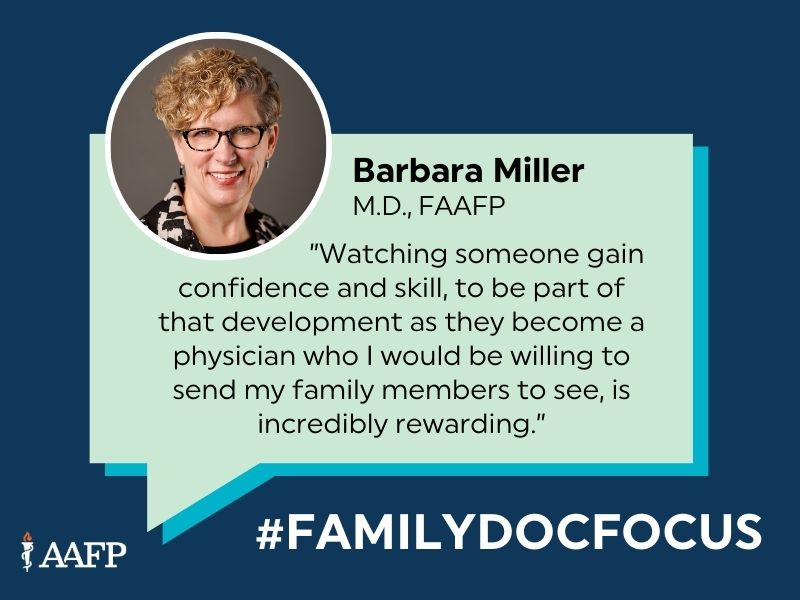Small Residency Starting to Produce Big Results for Rural Community
March 12, 2025, David Mitchell — It will be a few more months before the first class of the Freeman Health System Family Medicine Residency graduates, but all four residents already have jobs lined up.
Barbara Miller, M.D., FAAFP, who started the program in late 2019 and welcomed that first class to Joplin, Missouri, in summer 2022, is proud to see her mentees complete their training. She’s also thrilled they aren’t going far.
“Three of the four are staying in Joplin,” said Miller, who will welcome her fourth class of up to five residents in the small, rural program on Match Day, which is March 21. “That’s our mission, so that’s exciting. Two are staying with the hospital system, including one who will do hospital medicine and serve as core faculty. One plans to do outpatient medicine, and I hope to rope her in as faculty as well.”
A third graduate will join a federally qualified health center in Joplin, which has about 53,000 residents, while the fourth, a Kansas City native, is headed home.
Miller knows rural health. She grew up in a small town south of Norman, Oklahoma, attended a small, private college in rural Missouri and returned to the Sooner State for medical school and residency training at the University of Oklahoma.

To meet a graduation requirement at OU, Miller spent a month in tiny Shattuck, Oklahoma, just east of the Texas state line, southeast of the Oklahoma panhandle and close to not much of anything else.
Miller’s husband, Garrett, is from western Oklahoma and wanted to return, so the family moved back to Shattuck after Miller completed residency. In more than a decade in the town of roughly 1,300, she was a practice partner and later a solo physician.
“I loved the breadth of what those docs did and the investments they made in their community,” she said. “They were supportive of a new graduate who wasn’t quite ready to be on her own, and that experience cemented my heart in rural family medicine.”
Ironically, it was Miller’s husband who convinced her to leave when a former mentor and member of the OU faculty in Tulsa called and asked if she would come back to the university system to teach.
“I’d never considered education as a career,” she said. “I was flattered, but after I hung up, I laughed and called my husband. He’s the one who said, ‘You need to call her back.’ I didn’t think he would be willing to move to Tulsa, but he was. That led to me to working in academic medicine, which I absolutely love. Watching someone gain confidence and skill, to be part of that development as they become a physician who I would be willing to send my family members to see, is incredibly rewarding.”
In 2013, Miller became an assistant professor in the Department of Family and Community Medicine at OU’s Tulsa campus. A year later, she added assistant program director to her duties before becoming program director in 2016.
In 2019, she returned to Missouri with the chance to start a new program.
Register for Residency
Leadership Summit
Hundreds of family medicine residency leaders from across the country will gather March 25-27 in Kansas City, Missouri, for the Residency Leadership Summit.
The event will help you:
- Implement ACGME requirements.
- Learn best practices.
- Connect with peers.
- Learn strategies to improve the quality of your program.
Can’t make it? Check out RLS on Demand.
“The idea of starting a program from scratch was intriguing to me,” Miller said. “Trying to effect change in a program that had been around for 40 years was not easy. I liked the idea of forming something from the ground up, and I also liked the mission of training physicians to go into rural medicine.”
Moving to a smaller program also gave Miller more control.
“I’m not in a department of family medicine now,” she said. “I’m the de facto ‘chair.’ I’m more directly involved in recruiting family physicians for the health system. I have a voice in the process and a more direct line to executives making decisions. It makes the job easier if you can get resources without wading through levels of university bureaucracy. I understand that world, too, and that helps from a Board perspective.”
Miller joined the Board of Directors of the Association of Family Medicine Residency Directors last year. She has experienced large, small, urban and rural programs as well as the challenge of getting a new program accredited. For the Joplin program, that process took more than two years because its first application failed.
“It was soul crushing at the time,” Miller said, “but it helped us get to a better place. It ended up being a good thing because it caused us to go back and strengthen things that needed it.”
Miller credits John Paulson, D.O., Ph.D., FAAFP, with getting her involved in state chapter leadership. Paulson, the chair of primary care on the Joplin campus of Kansas City University, which is the Freeman residency program’s sponsoring institution, is a past president of Missouri AFP.
“He doesn’t take no for answer,” said Miller, who has served on the MAFP Board since 2021. “Any family physician under his umbrella gets plugged into MAFP, and I’m glad. They are a great group that is super active and doing a lot of interesting things. All the Missouri family medicine residency programs are working together in a learning network that will support programs and help improve health in the state, and MAFP is the hub for that effort.”